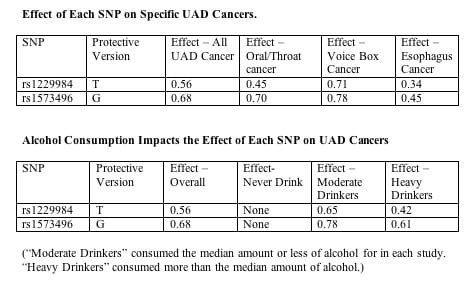 A new study in Nature Genetics shows that the increased risk of developing cancer in the mouth, throat, voice box and esophagus due to drinking is partially offset by the rarer versions of two SNPs associated with alcohol metabolism.
A new study in Nature Genetics shows that the increased risk of developing cancer in the mouth, throat, voice box and esophagus due to drinking is partially offset by the rarer versions of two SNPs associated with alcohol metabolism.
Cancers of the oral cavity, throat (also called the pharynx), voice box (or larynx) and esophagus are collectively known as upper aerodigestive (UAD) cancers. Alcohol consumption is known to be a significant risk factor for these cancers. Studies have shown that the areas of the body that come into closest contact with ingested alcohol are at highest risk of being affected by cancer.
The two SNPs associated with UAD cancers are both located in genes that are part of the alcohol dehydrogenase (ADH) enzyme pathway, a group of proteins that aids the body in metabolizing alcohol. The authors of the study hypothesize that the protective versions of the SNPs they found exert their effect on UAD cancers by changing the carcinogenic effects of alcoholic beverages. These SNPs had no effect among non-drinkers.
Hasibe et al studied six SNPs in ADH pathway genes in a total of 3,876 people with UAD cancers and 5,278 healthy controls, in hopes of finding DNA variants associated with these diseases. This large study group was comprised of three smaller study groups: one group from eastern Europe with 809 patients and 2,586 controls; one group from western Europe with 1,356 patients and 1,407 controls; and a final group from Latin America with 1,711 patients and 1,285 controls.
Both rs1229984 and rs1573496 were significantly associated with UAD cancers in the large study group and each of the smaller study groups individually.
When the researchers broke the patients into groups based on specific cancer type — oral/throat, voice box, and esophagus — they found that both SNPs impacted the risk of developing the subtypes of cancer to different extents (see the chart at the end of this post for details).
About 19 out of every 100,000 people is diagnosed with UAD cancer per year in the United States. Individually, the lifetime risks of developing these cancers are: oral/throat, 1 in 99; voice box, 1 in 274; and esophagus, 1 in 198.
Those who have one or two copies of the T version of rs1229984 were found to have 0.56 times the odds of developing UAD cancer compared to those with two C versions. For those who carry one or two copies of the G version of rs1573496, their odds of developing UAD cancer were 0.68 times those with two C versions. People who carry at least one T at rs1229984 and one G at rs1573496 were found to have 0.45 times the odds of developing UAD cancer compared to people who had no protective versions of either SNP.
The authors say that the exact mechanism by which the protective versions of these two SNPs are working is not clear. It is known that people with one or two copies of the T version of rs1229984 metabolize ethanol up to 100 times faster than people with two copies of the C version. The authors of this study speculate that this faster metabolism may protect tissues by reducing their exposure to the effects of alcohol.
The tables below sum up the results of this study. The “effect” of each SNP is the change in odds for carrying either one or two copies of the protective version.




